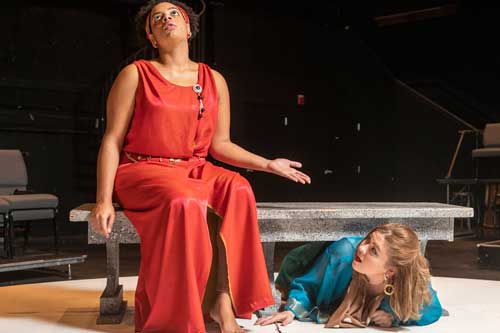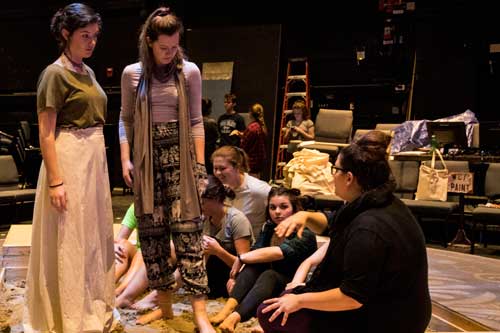It’s days before the October 11 premiere of URI Theatre’s “Women and War,” and the actors are revved up.
And nervous. And sad. And anxious. And excited. All emotions accounted for.
Director Kira Hawkridge ’12 opens her rehearsals with what she calls a check-in. She invites each student to share something of their day and mood — and takes the emotional pulse of the ensemble in the process. In Athenian (read democratic) fashion, each actor has their turn.
Some answers are lighthearted: “I had such a good nap today!”
“I took the Pottermore quiz, and I’m in Gryffindor!”
“Today was good. I slept in. Till nine. Had healthy, multi-grain foods.”
“I’m getting a ferret!”
Big applause on that last one. Clearly, this is a crowd that appreciates a good ferret. Of course, the palpable enthusiasm of the actors could be more about the unveiling of the sandbox. It’s beneath the stage and will be used in the second act of the show, “Trojan Women,” which finds the female survivors of the Trojan War mourning their ruined city after the defeat of their army.
“Women and War,” in fact, comprises two plays: the 411 BCE comedy “Lysistrata” and the tragedy “Trojan Women” and so requires that actors have access to a range of emotions during the course of the performance.
Hawkridge, whose day job is artistic director and founder of OUT LOUD Theatre in Providence, uses exercises like the check-in, along with movement and improvisation, to make a student actor aware of how their emotions are tools they can employ and deploy in performing. A Hawkridge production is as heavily reliant on the actor’s body language as it is on what that actor says to tell a story. When effective, the performance has special meaning for the individual audience member.
“The most exciting and fulfilling thing for me is that the audience walks away with something that is personal to them,” Hawkridge said.
What might that thing be?
“‘Lysistrata’ is an expansive celebration of what’s possible when people come together and ‘Trojan Women’ is about survival and the necessity of finding and connecting to our collective humanity,” Hawkridge said.
In other words, it’s a check-in for all involved.


